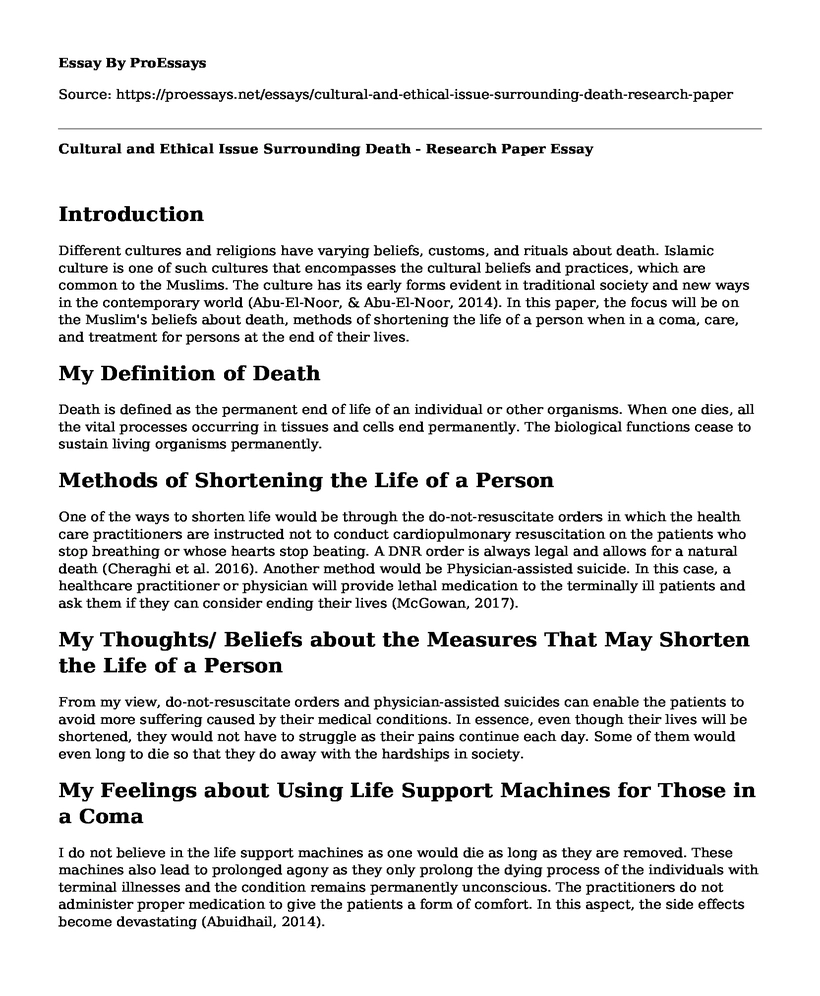Introduction
Different cultures and religions have varying beliefs, customs, and rituals about death. Islamic culture is one of such cultures that encompasses the cultural beliefs and practices, which are common to the Muslims. The culture has its early forms evident in traditional society and new ways in the contemporary world (Abu-El-Noor, & Abu-El-Noor, 2014). In this paper, the focus will be on the Muslim's beliefs about death, methods of shortening the life of a person when in a coma, care, and treatment for persons at the end of their lives.
My Definition of Death
Death is defined as the permanent end of life of an individual or other organisms. When one dies, all the vital processes occurring in tissues and cells end permanently. The biological functions cease to sustain living organisms permanently.
Methods of Shortening the Life of a Person
One of the ways to shorten life would be through the do-not-resuscitate orders in which the health care practitioners are instructed not to conduct cardiopulmonary resuscitation on the patients who stop breathing or whose hearts stop beating. A DNR order is always legal and allows for a natural death (Cheraghi et al. 2016). Another method would be Physician-assisted suicide. In this case, a healthcare practitioner or physician will provide lethal medication to the terminally ill patients and ask them if they can consider ending their lives (McGowan, 2017).
My Thoughts/ Beliefs about the Measures That May Shorten the Life of a Person
From my view, do-not-resuscitate orders and physician-assisted suicides can enable the patients to avoid more suffering caused by their medical conditions. In essence, even though their lives will be shortened, they would not have to struggle as their pains continue each day. Some of them would even long to die so that they do away with the hardships in society.
My Feelings about Using Life Support Machines for Those in a Coma
I do not believe in the life support machines as one would die as long as they are removed. These machines also lead to prolonged agony as they only prolong the dying process of the individuals with terminal illnesses and the condition remains permanently unconscious. The practitioners do not administer proper medication to give the patients a form of comfort. In this aspect, the side effects become devastating (Abuidhail, 2014).
The Person Who Should Decide Care and Treatment for a Person at the End of His or Her Life
The healthcare practitioners should decide the most appropriate care for people who are at the end of their lives after assessing their conditions and establishing the degree of survival. In this aspect, the practitioners may suggest the most efficient techniques for treatment (Abuidhail, 2014).
My Thoughts/ Beliefs about Research That Attempts To Change Genes So That We Can Extend the Lifespan - Perhaps Indefinitely
Modification of a person's lifespan through manipulation of genes may be essential as it increases longevity and improves the quality of life of different people. Therefore, I consider it a crucial aspect.
How My Feelings/ Beliefs about the End of Life Are Influenced By Your Culture
In my culture, people believe that one should not struggle for so long with a condition. As such, they might call for physician-assisted suicides or even DNR to help shorten the lives of those individuals considered to be undergoing through a lot of suffering in society. I tend to support the arguments of people from my culture regarding how people with different conditions suffer and struggle to meet their societal needs.
The Rituals and Beliefs about Death from A Culture That Is Very Different From My Own and How the Culture Defines Death
In the Islamic culture, when one dies, the body is to be buried immediately after death, and the eyes and mouth of the deceased have to be closed. The funeral does not require the taking of photos or video recordings using different devices. In essence, the culture views death as a means through which one begins afterlife after the worldly life is terminated (Abu-El-Noor, & Abu-El-Noor, 2014).
References
Abu-El-Noor, N. I., & Abu-El-Noor, M. K. (2014). End of Life-Decisions: An Islamic Perspective. End of Life-Decisions: An Islamic Perspective, 10(1). Retrieved from http://dx.doi.org/10.18785/ojhe.1001.04
Abuidhail, J. (2014). Rural jordanian mothers' beliefs, knowledge and practices of postnatal care. Quality in primary care, 22(6). Retrieved from https://www.researchgate.net/profile/Jamila_Abuidhail/publication/275102363_Rural_Jordanian_Mothers'_Beliefs_Knowledge_and_Practices_of_Postnatal_Care/links/56ebd8c208aee4707a38418c/Rural-Jordanian-Mothers-Beliefs-Knowledge-and-Practices-of-Postnatal-Care.pdf
Cheraghi, M. A., Bahramnezhad, F., Mehrdad, N., & Zendehdel, K. (2016). View Of Main Religions of the World On; Don't Attempt Resuscitation Order (DNR). International Journal of Medical Reviews, 3(1), 401-405. Retrieved from http://www.ijmedrev.com/article_63020_9c7c309bbe5fbf3278fcea7dd18fb7ef.pdf
McGowan, K. (2017). Physician Assisted Suicide a Constitutional Right?. The Catholic Lawyer, 37(3), 4. Retrieved from https://scholarship.law.stjohns.edu/tcl/vol37/iss3/4?utm_source=scholarship.law.stjohns.edu%2Ftcl%2Fvol37%2Fiss3%2F4&utm_medium=PDF&utm_campaign=PDFCoverPages
Cite this page
Cultural and Ethical Issue Surrounding Death - Research Paper. (2022, Dec 22). Retrieved from https://proessays.net/essays/cultural-and-ethical-issue-surrounding-death-research-paper
If you are the original author of this essay and no longer wish to have it published on the ProEssays website, please click below to request its removal:
- Mill, Kant and The Ethical Divid - Utilitarianism and Deontology
- Comparing and Contrasting the Ethics of Epicureanism and Stoicism as a Way of Life
- Paper Example on Naturalism, Realism, Modernism in Literature
- Essay Sample on Cultural Competence
- Globalization on the Ultimate Fighting Championship (UFC) Paper Example
- Aristotle's Tragic Hero: Flawed but Godly Character - Essay Sample
- Family Culture, Trends & Technology - Essay Sample







